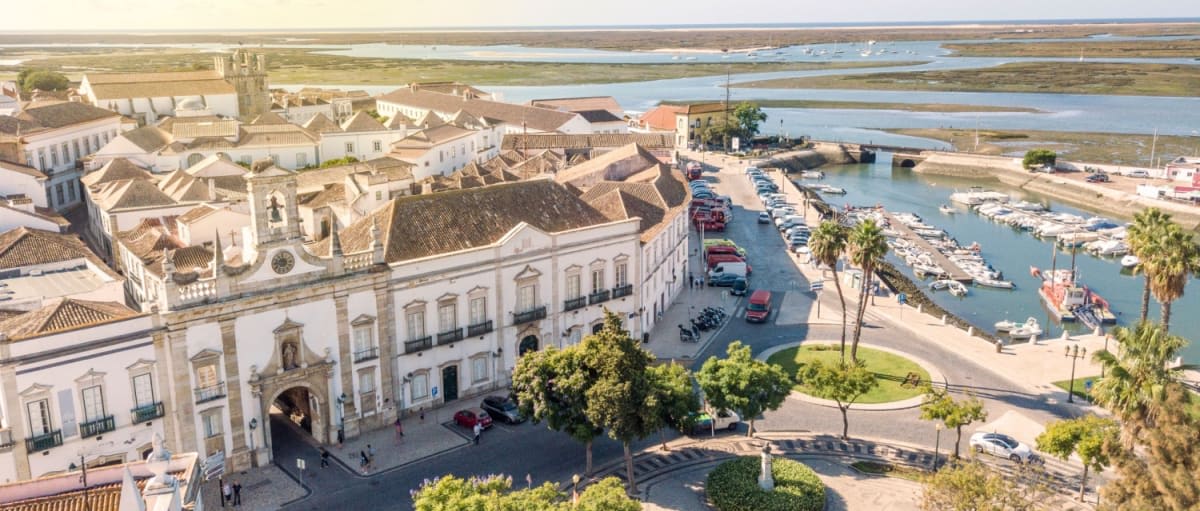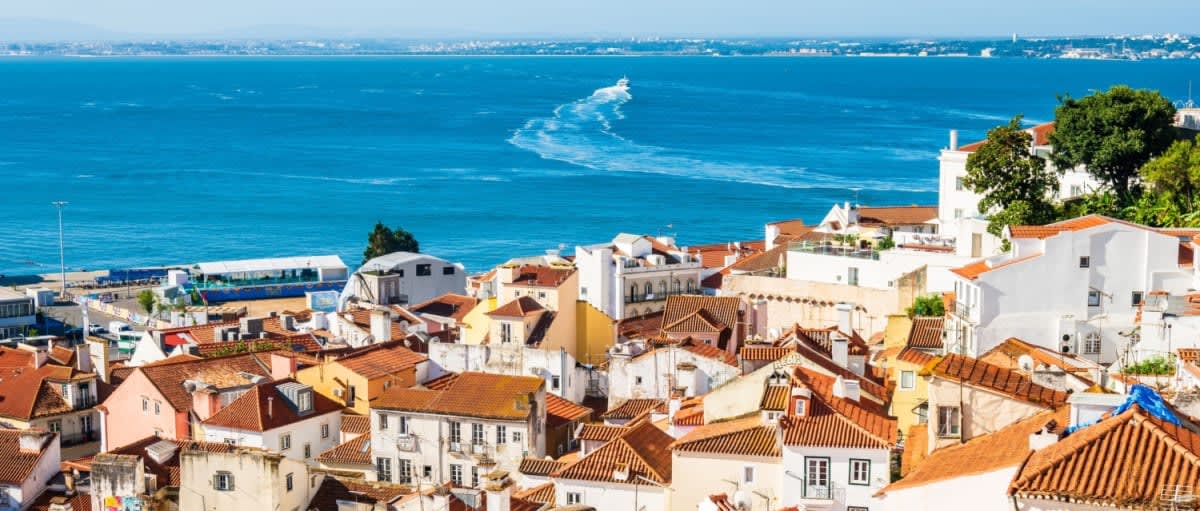Portugal continues to be a top destination for international property buyers drawn by its warm climate, relatively low cost of living and high quality of life. But if you’re buying property in Portugal and plan to spend more than 90 days per 180-day period in the country, visa and residency rules will apply. Navigating this process depends on your nationality, length of stay and your reasons for living in Portugal. It’s important you explore all the visas & residency options for non-residents in Portugal.
In this article, updated for 2025, we explain the key visa categories available to non-EU, non-EEA and non-Swiss citizens – including work visas, retirement visas, digital nomad permits and the family reunification pathway. Whether you’re retiring, working remotely, investing or starting a business, there’s likely a suitable route available. We also address what EU citizens need to know and explore the recent changes to the golden visa programme.
Download the Portugal Buying Guide
Contents
- Who needs visas & residency options for non-residents in Portugal
- Short-stay visas and the 90/180 rule
- Long-stay visa options
- Work visa (D1) – for contracted employment
- Entrepreneur visa (D2)
- Highly qualified visa (D3)
- Income-based visa (D7)
- Digital nomad visa (D8)
- Golden visa – major changes in 2023
- Family reunification visa (D6)
- Frequently asked questions

Who needs visas & residency options for non-residents in Portugal
Citizens from the EU, EEA and Switzerland do not need a visa to enter or live in Portugal. However, if you’re staying more than 90 days, you’ll need to register locally and apply for a Certificado de Registo (Certificate of Registration) from the Portuguese municipality where you reside. This confirms your legal stay and is mandatory for stays over three months.
For non-EU citizens – including British, American, Australian and Canadian nationals – visa and residency rules differ. If you plan to stay over 90 days in any 180-day period, or take up residence in Portugal, you must apply for the appropriate visa in advance. This visa then allows you to apply for a residence permit after arriving.
The visa application is usually handled by the Portuguese consulate or via VFS Global. Once in Portugal, long-term residents must attend an in-person appointment with AIMA (Agência para a Imigração e Mobilidade) to receive their residence permit card. This replaces the now-disbanded SEF office.
For a more detailed look at the step-by-step of the purchase process, claim your free copy of our Portugal buying guide:
Download the Portugal Buying Guide
Short-stay visas and the 90/180 rule
The Schengen short-stay visa allows non-residents to spend up to 90 days in any 180-day period within the Schengen zone, which includes Portugal. This visa is typically waived for citizens from countries including the UK, USA, Australia, Canada and New Zealand, meaning you can visit Portugal visa-free for short visits.
If you’re only using your Portuguese property as a holiday home or staying less than 90 days per half-year, you can often rely on this exemption. However, it’s essential to track your days carefully, as overstaying can lead to penalties and entry bans across Schengen countries. Border officials assess your travel record via passport stamps and digital border records.
If you require a short-term visa for reasons such as study, training or seasonal work that exceeds 90 days, you must apply for a Temporary Stay Visa. This allows you to remain in Portugal for up to one year, though it does not always lead to permanent residency.
Long-stay visa options
Portugal offers a category of national long-stay visas, known as Type D visas, which are typically valid for four months and allow you to request a residence permit immediately upon arrival. These visa routes are designed for those relocating for work, family, retirement or investment purposes.
The most common long-stay visa options in Portugal include:
- D1 – for salaried employees
- D2 – for entrepreneurs or freelancers
- D3 – for highly qualified professionals
- D7 – for passive income earners and retirees
- D8 – for digital nomads and remote workers
- D6 – for family reunification
Most visa applications incur a fee of around €80 at your home consulate and an additional €170 at AIMA for the residence permit. For the latest fees and timelines, check the official government visa portal.
Work visa (D1) – for contracted employment
The D1 visa is for those offered a job by a Portuguese employer. It’s just one of the visas & residency options for non-residents in Portugal. It allows you to live and work in Portugal and access public services. To apply, the job must be registered with the Portuguese employment service (IEFP) and remain unfilled for at least 30 days before being offered to a foreign national.
To qualify, you must:
- Hold a valid job offer from a Portuguese company
- Present a signed contract of employment longer than 12 months
- Apply at the Portuguese consulate in your country
In some cases, consulates in countries such as the US, Australia and Japan allow D1 applications after arrival in Portugal, but this depends on bilateral agreements.
Once in Portugal, you will need to register with AIMA for your residence card, which is valid for two years and renewable. Portuguese salaries for visa holders must meet local statutory minimums and may be higher depending on your profession.
Entrepreneur visa (D2)
The D2 visa supports entrepreneurs, startup founders and independent workers setting up in Portugal. Whether launching a new business or freelancing remotely with clients abroad, this visa allows you to live and operate in Portugal legally.
To apply, you must provide:
- A viable business plan relevant to the Portuguese economy
- Proof of financial support and investment capital
- Evidence of business registration or pre-contracts (for freelancers)
Once you’re granted the visa, you’ll have four months to relocate and secure a residence permit. This will initially last two years, provided you spend at least 16 months in Portugal during that time. After five years, you can apply for permanent residence.
Processing typically takes up to 60 days at the consulate. Once established in Portugal, your business can continue to serve international clients or expand locally.
Highly qualified visa (D3)
The D3 visa is tailored toward professionals in specialised sectors such as engineering, science, law, healthcare and academia. It allows non-EU experts to live and work in Portugal and can fast-track access to an EU Blue Card in some cases.
To be eligible, you’ll need to provide:
- A confirmed job offer for a recognised role of high qualification
- Evidence of relevant degrees or professional qualifications
- A salary equal to or exceeding 1.5 times the annual Portuguese average
The D3 residence permit is valid for two years and may be renewed. After five years of legal residence, you may apply for permanent status. If your profession is regulated, such as healthcare, you may also need to register with the relevant professional body.
Income-based visa (D7)
The D7 visa is ideal for retirees and individuals who can live off savings or passive income. If you have a pension, dividends, property income or royalties and don’t intend to take up employment in Portugal, this is likely to be the right visa for you.
In 2025, the minimum income threshold for a single applicant remains around €820 per month (€9,840 annually), based on the Portuguese minimum wage. Applicants must prove:
- Regular passive income (e.g. pensions, investment returns)
- A Portuguese residential address
- Full private health insurance
Once approved, the initial residence permit is valid for two years and requires you to remain in Portugal for at least six months per year. After that, a three-year renewal period applies. D7 visa holders gain access to healthcare and can apply for permanent residence after five years.
Digital nomad visa (D8)
Launched in 2022, the Digital Nomad Visa (D8) provides a legal pathway for remote workers and freelancers who earn income from companies based outside Portugal.
You can apply for either:
- A one-year temporary stay visa
- A two-year residence permit (renewable for three more)
To qualify, you must prove:
- Remote income of at least €3,280/month (4× Portuguese minimum)
- A remote employer or offshore clients
- Proof of accommodation
The D8 visa suits those working in fields such as IT, marketing, finance or creative industries. You’ll need to attend an appointment at AIMA within the first four months of arriving to finalise your residence permit.
Golden visa – major changes in 2023
Portugal’s popular Golden Visa scheme underwent significant reform in October 2023. Real estate investment is no longer an eligible route. However, the programme still welcomes foreign investors contributing to key sectors such as research, culture and business innovation.
Current qualifying options include:
- €500,000+ in Portuguese venture capital or investment funds
- €500,000 in a business, creating at least five jobs
- €250,000 donation to cultural or heritage projects
The major benefit of the golden visa remains its low physical presence requirement – just seven days per year. It is suitable for investors who don’t wish to relocate permanently. Initial permits are valid for two years, then renewable for two more.
Costs can be significant, with initial registration around €5,800 per applicant and renewals incurring further fees. Speak to a regulated investment adviser before proceeding.
Download the golden visa guide
Family reunification visa (D6)
If you’re living in Portugal with a valid residence permit, you may apply for family reunification to bring eligible relatives to join you. The D6 visa is open to spouses, dependent children or financially dependent parents.
To apply, you must:
- Hold a valid Type D residence permit
- Prove your relationship (marriage/birth certificates)
- Demonstrate sufficient income and housing to support your family
Minimum income for the primary sponsor is currently set at €820 monthly, rising by 50% for a second adult and 30% per child. All applications must originate in Portugal, submitted by the resident sponsor through AIMA.
The family member’s residence permit will match the sponsor’s in length and benefits. After five years, family members may apply for permanent residence in their own right.
For more information, speak to one of our consultants.
If you’re planning a move and considering where to buy property in Portugal, it’s worth exploring the different regions to find a location that fits your lifestyle and visa strategy. And when you’re ready to take the next step, our guide on how to buy property in Portugal walks you through every stage of the process – from choosing a lawyer to finalising your purchase.
Frequently asked questions
No – property ownership does not require a visa. However, if you plan to stay in Portugal for more than 90 days, you’ll need to apply for a long-stay visa and residence permit depending on your purpose (retirement, work, remote income, etc.). So at that point you need to explore visas & residency options for non-residents in Portugal.
The D7 visa is for passive income earners such as pensioners or landlords. The D8 is for digital nomads who earn active remote income from outside Portugal. Both lead to residency but have different financial and documentation requirements.
Yes – Portugal offers a family reunification visa (D6). Once you’ve secured a residence permit, you can apply to bring spouses, dependent children and parents, as long as you meet income and accommodation requirements.









